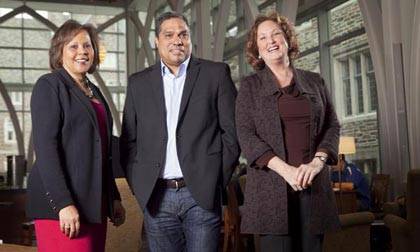
Duke sociology professor Eduardo Bonilla-Silva recalled the time
in 1984 when he scored a 98 on a statistics exam. The professor wrote
"excellent" on the exam in red ink, which at first glance would appear to be a compliment.
But Bonilla-Silva noticed that two white classmates had scored a
100, and their perfect grades came with no additional praise.
The implied message, he said, was that scoring a 98 was
exceptional for him because he's black and Hispanic, but not for the white
students.
Racism, Bonilla-Silva said, is just as pervasive in academia as it
is in society. It's not as blatant as it once was and sometimes it's even
disguised as a compliment as it was for him in 1984. But, he said, negative
assumptions are constantly being made about international students and students
of color, and part of his job as a mentor is to help them overcome the
obstacles they will face due to their race, their ethnicity, or their nationality.
"He has created a safe space for us to come and discuss our own issues
and frustrations," said one of his doctoral students. "His willingness to
expose his own vulnerability and discuss the difficulties he faced in graduate
school and academia are what make professor Bonilla-Silva unlike any other."
Great Teachers

Aaron Thornburg, a doctoral candidate in cultural
anthropology, is considered by faculty to be "a model of dedicated,
innovative teaching" during his time at Duke" who is "beloved by
his students" and who is "a friendly, energetic, smart teacher who
commits great thought and energy to his teaching."
Read more about Aaron
here.

Allison Wisecup's students enthusiastically respond to her
teaching style, saying that "the content is interesting and the professor
is very passionate and engaged, making it fun" to listen to her, noting
that "her lectures always kept me enticed."
Wisecup is a doctoral candidate in the Department of
Sociology. Read more about Allison
here.
Bonilla-Silva is one of three professors to receive the 2011
Dean's Award for Excellence in Mentoring. The other two are Paula D. McClain,
professor of political science, and Kristine
Stiles, France Family Professor of Art, Art History and Visual Studies.
(Two graduate students, Kaoru Ikouma of civil & environmental engineering and Terry Jackson of genetics and genomics, were honored with student awards for excellence in mentoring. For more, see below.)
The Graduate School initiated the award in
2004 to acknowledge those who consistently help students navigate the rigors of
graduate school. It's designed to promote a culture of mentoring, which in turn
leads to more engaged students who are more likely to both graduate and excel
in the job market.
How that happens takes myriad forms. McClain, for example, was
commended for including students in the Durham Pilot Project, a long-term
assessment of tensions between blacks, whites and an emerging Latino population
in the South. She "did not use the graduate students on that project simply to
provide grunt work," one student said. "She gave us the opportunity to be
collaborators and co-authors."
Stiles received high marks for bringing out the best in her
students. She "exhibited great enthusiasm for my ideas and fostered my
intellectual growth with continuous support," one student said, "meeting with
me on a regular basis, always answering my emails and encouraging me to ask
questions and seek out her help."
The road to a Ph.D. is rife with pitfalls. "This is not easy,"
McClain said. "There are lots of points where one can stumble, whether it's in
graduate school or as an assistant professor. There are certain periods where
students need a lot of support."
All three - McClain, Bonilla-Silva and Stiles - made it very
clear that they do everything they can to make sure that when their students
stumble they do not fall. As Stiles put it, "I am a very attentive adviser, and
I am always available to my students." But, she noted, "I am also very
demanding."
****
Students are called upon to be mentors as well, aiding other
students navigate aspects of graduate school life. Each year the Graduate School honors two students for their
mentoring efforts.
Kaoru Ikuma is a
Ph.D. candidate in the Department of Civil & Environmental Engineering,
Kaoru's nominators appreciate the personal qualities she exhibits that
demonstrate her concern for others and which extend from the individual to the
entire department, as one observes, "Kaoru is an excellent mentor because
she understands the patience and empathy required to be a good teacher.
Read more about Kaoru here.
Terry Jackson is a doctoral candidate in the University
Program in Genetics and Genomics. Terry's collaborative nature and his ability
to connect with others are seen by his nominators as among his strongest
assets, who note that "Terry's greatest strength is his ability to create
strong connections with those around him." They say that he is
"one of those people that you can immediately connect with" and that he
"truly cherishes engaging in the development of his fellow students."
Read more about Terry here.